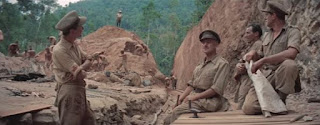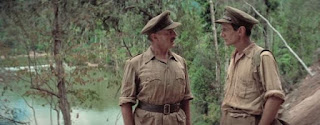It's the last line of The Bridge on the River Kwai, David Lean's controversial (at the time) film of the Pierre Boulle novel that had gained international fame. I've been working on a piece for this movie for awhile, but it's been delayed because, like Lean, I'm being a bit persnickety with it.
But, I know enough about it that I know that one theme I glance over is the psychological element that Lean, Boulle and screenwriters Carl Foreman and Michael Wilson (now it can be told, after the dark days of the "blacklist") have to carefully construct in order for it to seem plausible. The building of the Burma Railway was quite a different matter than the circumstances shown in the film. The real British commander of the project, Lieutenant-Colonel Philip Toosey, did much to slow down construction and even do sabotage-work on the structure by poorly mixing concrete for the pillars and collecting termites to chew and weaken the wooden sections.
Toosey was not a collaborator. The film's Col. Nicholson, played by Alec Guinness, certainly can be considered one. Perhaps it is all the time spent in the hot-box that has influenced his decision, maybe his ego, stiff-upper-lip-stubbornness and his by-the-book regimentation—he has ordered that none of his men attempt an escape as he was ordered to surrender to the Japanese and any behavior contrary to that order would be considered insubordination—but, once he has been put in charge, he orders that any further sabotage, deliberately poor workmanship, or delay by the men (as was demonstrated by Toosey's group) will not be tolerated. For Nicholson, it's a personal war demonstrating the superiority of their abilities over the Japanese.
But, in the overall scheme of things, he's creating something that will help the Japanese war-effort. He doesn't have the overall view that more soldiers, British and otherwise, will be killed because of his short-term goals. He may win his little victory, but it might help lose the war.
But, the ego and conditioning don't allow him to consider that—it's a matter of pride, building the bridge that will last "in years to come" but will those who use it be colleagues he'd recognize or enemies he once fought against?
But, that's not considered. Bring up the point and it's not taken seriously. In fact, it seems to be enemy action. And the best way for someone so sure to counter-attack is to put the onus on the one not sure and break them down that way. It's a simple matter of deflection. "No, I'm not crazy. You are. The problem isn't me. It's you! I know. You don't."
Sounds awfully familiar.
The Set-up: British POW's, ostensibly led by the highest ranking, Col. Nicholson (Alec Guinness), are taken to a Japanese work-camp in Burma overseen by Colonel Saito (Sessue Hayakawa), who has charged these new prisoners with building the bridge over the river Kwai linking Bangkok and Rangoon by a certain date. If Saito cannot complete the bridge on time he is charged with committing suicide. After initial resistance to work by officers, Nicholson—who'd been ordered to surrender and has ordered his men not to attempt any escape lest it be considered treason—for the better treatment of his men (and to make certain patriotic and racial points) agrees that his unit will design and build a better bridge that will stand the test of time. Little does he know that a British commando unit has been dispatched to destroy the militarily-valuable bridge.
Action!
COL. NICHOLSON: Hello, Clipton.
COL. NICHOLSON: About time you paid us a visit.
COL. NICHOLSON: Fine job our chaps are doing.
CLIPTON: Yes. How's he behaving?
COL. NICHOLSON: He's been most reasonable since we took over. -
CLIPTON: What's he thinking? -
COL. NICHOLSON: I haven't the foggiest. -
COL. NICHOLSON: Thanks, Reeves. -
REEVES: Right, sir.
COL. NICHOLSON: What do you think?
COL. NICHOLSON: Quite a challenge, isn't it?
CLIPTON: Are you convinced that building this bridge is a good idea?
COL. NICHOLSON: Are you serious? -
CLIPTON: Yes, sir.
COL. NICHOLSON: A good idea?
COL. NICHOLSON: Take another look.
COL. NICHOLSON: You don't agree morale is high? Discipline has been restored?
COL. NICHOLSON: Their condition has improved? Are they a happier lot or aren't they?
CLIPTON: Yes, sir, but....
COL. NICHOLSON: They feed better and they are no longer abused or maltreated.
CLIPTON: That's all true...
COL. NICHOLSON: Well, then... Honestly, Clipton, there are times when I don't understand you at all.
CLIPTON: I'll try to make myself clear. The fact is, what we're doing could be construed as...forgive me, sir, collaboration with the enemy. Perhaps even treason.
COL. NICHOLSON: Are you alright, Clipton? We're prisoners of war. We haven't the right to refuse to work.
CLIPTON: I understand that, sir. But must we work so well? Must we do better than they could themselves?
COL. NICHOLSON: If you had to operate on Saito, would you do your best or let him die? Would you prefer we disintegrate in idleness?
COL. NICHOLSON: Or have it said we can't do a proper job?
COL. NICHOLSON: It's important to show them they can't break us in body or in spirit.
COL. NICHOLSON: Take a good look, Clipton.
COL. NICHOLSON: One day the war will be over. I hope that those who use the bridge in years to come...
COL. NICHOLSON: ...will remember how it was built...
COL. NICHOLSON: ...and who built it.
COL. NICHOLSON: Not a gang of slaves, but soldiers. British soldiers, even in captivity. -
CLIPTON: Yes, sir. -
COL. NICHOLSON: You're a fine doctor, Clipton…
COL. NICHOLSON: ...but you've a lot to learn about the army.
The Bridge on the River Kwai
Words by Carl Foreman and Michael Wilson
Pictures by Jack Hidyard and David Lean
The Bridge on the River Kwai is available on DVD and Blu-Ray from Columbia Home Video.










































No comments:
Post a Comment